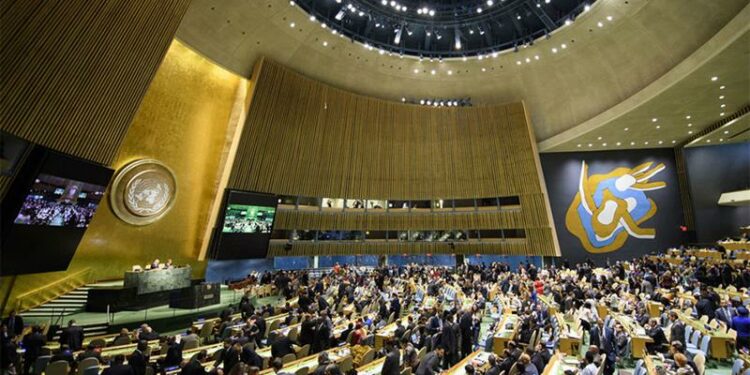United Nations member states have passed a non-binding resolution calling for an end to Israel’s occupation of Palestinian territories within 12 months, urging sanctions for non-compliance.
The resolution, which Israel criticized as a potential trigger for increased violence, stems from an advisory opinion issued by the International Court of Justice deeming the occupation since 1967 “unlawful.”
The resolution garnered support from 124 nations, while 14 opposed it, and 43 countries abstained from voting.
The resolution was brought forward by Arab nations during a special session convened just ahead of the UN General Assembly, which will see numerous heads of state and government convene at UN headquarters.
The text of the resolution explicitly “demands that Israel brings to an end without delay its unlawful presence in the Occupied Palestinian Territory,” setting a deadline of 12 months from the date of adoption.
This marks a notable shift in international pressure on Israel, with the first draft of the resolution being prepared in just six months.
Palestinian Ambassador to the UN, Riyad Mansour, emphasized the international community’s role in forcing Israel to change its approach, citing both the General Assembly’s pressure and the ICJ’s historic ruling.
“The idea is you want to use the pressure of the international community in the General Assembly and the pressure of the historic ruling by the ICJ to force Israel to change its behavior,” Mansour stated.
However, Israel’s response was one of firm rejection. Its ambassador to the UN, Danny Danon, denounced the resolution, describing it as a “shameful decision” and accusing it of supporting what he called the Palestinian Authority’s “diplomatic terrorism.”
He further criticized the resolution for failing to condemn Hamas and for not addressing the release of hostages captured in the October 7 attacks. “Instead of marking the anniversary of the October 7 massacre by condemning Hamas and calling for the release of all 101 of the remaining hostages, the General Assembly continues to dance to the music of the Palestinian Authority, which backs the Hamas murderers,” Danon said.
The resolution calls for several key actions, including the withdrawal of Israeli forces from the Palestinian territories, the cessation of settlement expansion, the restitution of seized land and property, and the right of return for displaced Palestinians.
Additionally, it urges member states to halt arms transfers to Israel when there is suspicion that the weapons might be used in the Occupied Palestinian Territory.
Mansour, speaking before the passage of the resolution, highlighted the plight of Palestinians, stating, “The Palestinians want to live — not survive. They want to be safe in their homes. How many more Palestinians need to be killed before change finally takes place to stop this inhumanity?”
He also noted the significance of the ICJ’s advisory opinion, which for the first time scrutinized the entirety of the Israeli occupation.
The United States, however, expressed strong opposition to the resolution. US Ambassador Linda Thomas-Greenfield described the resolution as “inflammatory” and argued that it does not contribute to peace.
She also pointed out the failure of the text to address Hamas’ influence in Gaza. “It also fails to acknowledge, among other things, that Hamas, a terrorist organization, is currently exerting power, control and influence in Gaza,” she stated, before affirming the United States’ vote against the resolution.
The General Assembly has taken on a significant role in addressing the Gaza conflict, as the Security Council remains stalled on the issue, largely due to repeated US vetoes of measures criticizing Israel.
The General Assembly, where no country holds veto power, has passed multiple resolutions supporting Palestinian civilians since the outbreak of the current war.
According to the health ministry in Gaza, which is governed by Hamas, more than 41,272 Palestinians, predominantly civilians, have lost their lives in Israel’s military operations in the Gaza Strip since the war began on October 7.
The United Nations has affirmed these figures as reliable. Meanwhile, the Israeli military has reported 348 of its soldiers killed since its ground offensive commenced on October 27.













